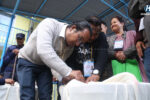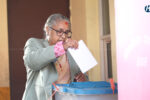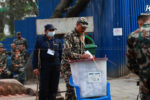KATHMANDU: The COVID-19 pandemic has made people, in fact, every individual, comprehend the gravity of health, prosperity, and discipline over anything.
As the world combats the coronavirus pandemic, the future seems uncertain raising a couple of questions in terms of the aftermath of the global pandemic.
The issue of public health and economic crises has become even more clear and profound. Due to COVID-19, the socio-economic impact is intense. The entire whole world is combatting the COVID-19 and addressing the socio-economic impact of COVID-19 is understandable.
The vaccine (or the drug) is yet to come. With the increasing cases of coronavirus infection in Nepal, it is now high time that every individual should think about the measures to mitigate the hazards it may have on matters relating to their concerns as well in the sectors involved.
Despite the efforts to bring the situation under control, doctors and experts put emphasis on precautionary measures against this dreadful virus.
One cannot deny the fact the lockdown has been aimed at preventing the spread of the deadly coronavirus. However, the preparedness, management, and planning of the lockdown are undoubtedly debatable.
One such measure is the enforcement of the prolonged nationwide lockdown by the government of Nepal which seems to be effective to some extent.
However, with the increasing cases of COVID-19, despite the lockdown, people have started questioning the full effectiveness of the lockdown.
One cannot deny the fact the lockdown has been aimed at preventing the spread of the deadly coronavirus. However, the preparedness, management, and planning of the lockdown are undoubtedly debatable.
In Nepal, the first COVID-19 case was seen on February 15. However, with the increase of coronavirus cases in India, the government here decided to impose a nationwide lockdown.
Initially, the situation was less precarious as the number of COVID-19 cases in Nepal was negligible. However, in about a month, positive cases increased significantly taking the toll to 100 by May 7, 2020, and now the number has reached 1,401 as of May 30, 2020.
The majority of the infected cases are those returning to Nepal from India. Observers believe that the lack of proper planning and management on the part of the government has led to such an increase.
Since the risk of transmission in the country seems high, the government needs to begin rescuing Nepali stranded at the Nepal-India border in a systematic and well-managed manner.
Question rising these days is: What has the government done so far to contain the spread of the virus?
The answer could be: While the lockdown is in force, industries producing essential goods (food, medicine and facial coverings) are allowed to operate; isolation facilities have been established at the local, provincial and federal levels; some heavily hit districts have been sealed off; and dissemination of information and safety measures on COVID-19 continue through different media such as television, internet and telephones, among others.
However, apart from health, the prolonged lockdown has left a serious impact on the country’s economy, and the government intends to ease the lockdown to recover the economic loss. For this, precautionary and safety measures, including social distancing, isolation booths, and quarantine facilities are indispensable before relaxing the lockdown.
Furthermore, the government needs to focus on the Nepali citizens stranded abroad as well as on the Nepal-India border.
Based on current data maintained by the Ministry of Health and Population, the majority of the coronavirus infected cases have entered from India.
Since the risk of transmission in the country seems high, the government needs to begin rescuing Nepali stranded at the Nepal-India border in a systematic and well-managed manner.
Some of the reasons for the surge in the number of coronavirus patients in the last few weeks in Nepal include:
● People are entering Nepal (legally and illegally) from the Nepal-India porous border
An increasing number of Nepali nationals are entering Nepal from India. While the majority of them enter the country through proper border points, a significant number of the people have entered clandestinely, thus making it difficult for the authorities to track or trace people entering through improper channels. This has increased the risk of transmitting the coronavirus disease to their relatives, friends, and society.
● The government has tried to ‘manage’ the border entry points. However, people are stranded and are compelled to stay at the border in crowds without proper shelter, food, sanitation and water.
The government has been endeavoring to manage the border points allowing Nepali nationals to enter with proper quarantine facilities in place.
However, the government has not been able to do enough when it comes to making provision for necessities, such as proper sanitation, food, drinking water, ambulances, and proper place to sleep, etc. in the quarantine facilities set up in different parts of the country.
More importantly, social distancing has not been maintained which increases the chances of spread.
● People are entering the hilly region from the Terai.
As coronavirus has been spread to most of the districts in the Terai, a substantial number of the people want to move to the hilly region, particularly the Kathmandu Valley. This, too, has sparked fears of spreading the infection throughout the country. Even though the government has prohibited the movement of the people from one district to the other, the number is increasing.
In what can be termed as worrying, a significant number of Nepali are stranded along the Nepal-India border – without proper food, shelter, sanitation, and place to sleep — desperately waiting for the government to rescue them, let alone maintaining social distance. It is, therefore, the government’s topmost priority to ensure its citizens’ safety and life. Sadly, the government has not yet acted upon to cope with the situation.
What could be the possible solutions?
The government needs to have a robust plan to rescue the stranded Nepali systematically with genuine tests of COVID-19.
To solve the problem of quarantines, hotels, schools and banquet halls could be used as quarantine centers and isolation facilities. It should be noted that the Hotel Association Nepal (HAN) has agreed to provide hotels to the government to be used as quarantines.
The government should accept the use of these facilities to provide proper quarantine services. It is understandable that there could be a price difference in the quarantine facilities based on the services provided.
● Basic quarantine facilities
This can be cost-free service to citizens with a proper place to sleep with three meals a day provided by the government, for those citizens who cannot afford to pay.
● Cost borne by the citizens
Citizens can stay at a hotel approved by the government but will have to pay for the rooms and meals themselves. The options of hotels can vary from 5-star to no-star hotels.
This will ensure that the government does not have to shoulder all the burden itself. Similarly, policies such as canceling the license of the hospitals not cooperating with the government can also be implemented.
What needs to be taken into consideration is that with the relaxation of the lockdown, the inter-district movement will rise, thus increasing the risk of spread if the virus.
There are enormous challenges in combating the COVID-19 in the country. Proper management, proper communication, and swift action need to be taken by the government to reduce the risk of transmission and reduce the number of infections.
To control this, the government needs to introduce some strong measures. Presenting a negative certificate should be made mandatory for people traveling from one district to the other.
The warning issued by the World Health Organization that the number of COVID-19 cases is likely to peak in June and July should be strictly taken into consideration both by the government and the people.
What needs to be seriously noted here is the fact that during monsoon, chances of floods in the southern plains and landslides in the hilly region cannot be ruled out, which can complicate the situation further.
Monsoon, besides bringing rainwater, could bring natural disasters such as floods and landslides. It should be noted that the number of people testing positive for coronavirus is more in the southern plains.
This poses a serious challenge for the authorities concerned to manage the quarantine facilities. The government, therefore, needs to think about it beforehand.
What also needs to be understood is that the coronavirus would not simply vanish with the relaxation of the lockdown, which has been taken as one of the best preventive measures. Therefore, it is high time that people understand the seriousness of the pandemic and take precautionary measures.
There are enormous challenges in combating the COVID-19 in the country. Proper management, proper communication, and swift action need to be taken by the government to reduce the risk of transmission and reduce the number of infections.
Meanwhile, being socially responsible, and thinking beyond personal interests and behavioral insights need to be considered. Most importantly, social responsibility needs to be well understood and adhered to by the people as well as the decision-makers.
(With inputs from Nitish Shrestha)









Comment